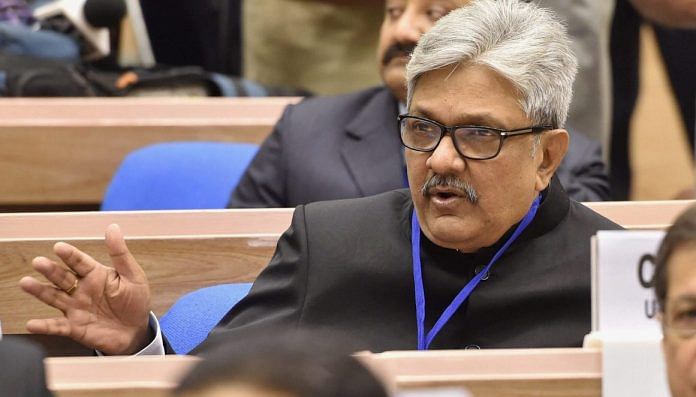‘Lack of unanimity’ is believed to have stalled decision; besides Joseph, SC collegium discussed names of judges from other high courts as well.
New Delhi: The Supreme Court collegium Wednesday deferred its decision on reiterating Uttarakhand High Court chief justice K.M. Joseph’s name for appointment as a judge of the top court. Sources said the decision could not be taken due to a “lack of unanimity”.
The five judges, who constitute the collegium for recommending names for elevation to the SC, also discussed names of senior judges from the high courts of Calcutta, Rajasthan, and Telangana & Andhra Pradesh for elevation as judges of the Supreme Court.
Sources told ThePrint that even as four judges were in agreement that Joseph’s name must first be reiterated before discussing fair regional representation from other high courts, the chief justice did not agree.
The sources said that apart from Joseph, the other names that the collegium considered were Indira Banerjee, currently chief justice of the Madras HC, who is originally from the Calcutta HC; Gujarat High Court CJ R. Subhash Reddy, who is originally from the Telangana and Andhra Pradesh HC; and Karnataka High Court CJ Dinesh Maheshwari, who is originally from Rajsthan HC.
The additional names were considered in light of the Modi government’s insistence, underlined in its letter to CJI Dipak Misra while returning the name of Joseph for reconsideration, that seniority and principle of regional representation must be taken into consideration while recommending names.
Sources in the top court told ThePrint that the collegium was not unanimous in its view and hence the meeting was deferred to have more deliberations. The next meeting of the collegium could take place Friday wherein a final decision could be taken.
It is learnt that a majority of the members of the collegium were of the view that only the name of Joseph should be sent Wednesday and other names could be recommended once the government clears his name. However, since there was no unanimity, the decision was deferred.
Experts said that if the collegium doesn’t send two separate recommendations — Joseph’s as reiteration and the other names as fresh recommendations — then, if the warrants of appointment are issued the same day, he could end up being junior to the others. This is because Joseph is junior to the three other names considered today in all-India seniority, the sources said.
The collegium comprises CJI Misra and Justices J. Chelameswar, Ranjan Gogoi, Kurian Joseph and Madan B. Lokur.
While recommending the name of Joseph, the collegium had taken into consideration the “combined seniority on all-India basis of Chief Justices and Judges of High Courts” as also their “merit and integrity”.
However, since the government has also referred to lack of seniority as one of the reasons for rejecting Joseph’s name, sources pointed out the fact that while Banerjee is number 5 in all-India seniority list, the other two judges — Reddy and Maheshwari — are at serial numbers 10 and 32, respectively.
Among the reasons the Centre listed for its opposition to Joseph’s elevation was that he is number 42 on the list of seniority of judges.
The third judges case
As per the third judges case, once the collegium reiterates its recommendation for the second time, the government is bound by it and has to make the appointment as per convention.
The third judges case is a 1998 case in which the apex court put down the law related to appointment of judges and emphatically validated the collegium system of appointing judges.
The case was a reference by then President K.R. Narayanan to the top court on the law regarding the collegium system and his constitutional powers to appoint judges.
The third judges case also says that in cases where recommendations of the collegium have to be reiterated, the decision must be unanimous.
The last time the government took such a stand was in 2012 and the collegium reiterated its stand to the UPA government to appoint justices Gopala Gowda, M.Y. Eqbal and Vikramjit Sen.
The collegium at the time led by CJI Altamas Kabir had in fact taken not more than a day to make it clear to the government that it stands by its recommendations.
Last week, escalating its conflict with the judiciary, the Modi government appointed senior advocate Indu Malhotra as a judge of the apex court while ignoring the other recommendation to elevate Joseph. Both recommendations were sent together to the government on 10 January.
A day later, the government wrote to the CJI, raising several objections against Joseph’s appointment.
Legal experts, including former CJI R.M. Lodha, have criticised the week-long delay by the collegium in reiterating Joseph’s name.



